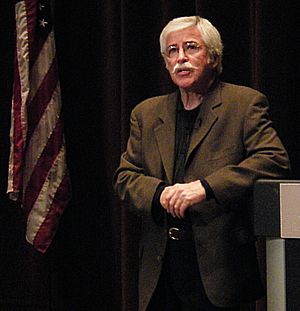William Least Heat-Moon facts for kids
Quick facts for kids
William Least Heat-Moon
|
|
|---|---|

Least Heat-Moon at the Seattle Public Library (2008)
|
|
| Born | William Lewis Trogdon August 27, 1939 Kansas City, Missouri |
| Occupation | Travel writer, historian |
| Language | English |
| Education | BA, MA, Ph.D. in English BJ in photojournalism |
| Alma mater | University of Missouri |
| Genre | Deep map, travel literature |
| Notable works | Blue Highways |
William Least Heat-Moon (born William Lewis Trogdon, August 27, 1939) is an American writer and historian. He is known for his travel books. He has English, Irish, and Osage heritage. He wrote several books about his unique trips across the United States. These include a boat journey and, in his most famous book, Blue Highways, a trip in a van.
Contents
About William Least Heat-Moon
William Trogdon was born in Kansas City, Missouri. His family name, Trogdon, comes from his European background. The name Heat-Moon comes from his Osage heritage. His father was called "Heat-Moon." His older half-brother was called "Little Heat-Moon." William was called "Least Heat-Moon."
William grew up in Missouri. He went to the University of Missouri. There, he earned several degrees in English. He also studied photojournalism. He later taught English at the university. Today, he lives in Boone County, near the Missouri River.
His Books and Journeys
William Least Heat-Moon has written many interesting books. They often describe his travels and discoveries.
Blue Highways (1982)
Blue Highways is a book about a three-month road trip. Least Heat-Moon took this trip in 1978. He had lost his teaching job and was going through a tough time. He traveled 13,000 miles across the United States. He mostly used small, secondary roads. These roads were often shown in blue on old Rand McNally maps, which gave the book its name.
He lived out of his van and visited small towns. He wanted to find places in America that were not changed by fast food or big highways. The book shares his search for meaning and his interesting meetings with people in roadside cafes. Blue Highways became very popular. It was on the New York Times bestseller list for 42 weeks.
PrairyErth: A Deep Map (1991)
PrairyErth: A Deep Map tells the story of Chase County, Kansas. It explores the history and people of this area in great detail. This book helped introduce the idea of a deep map. A deep map looks at a place in many different ways, including its history, nature, and people.
River-Horse (1999)
In River-Horse, Least Heat-Moon describes a four-month boat trip. He traveled almost 5,000 miles across the U.S. He used only the nation's waterways, from the Atlantic to the Pacific Ocean. He followed routes used by early explorers like Henry Hudson and the Lewis and Clark expedition.
Other Works
- Columbus in the Americas (2002) is a short history of Christopher Columbus's journeys.
- Roads to Quoz (2008) is another travel book. It shares many shorter trips Least Heat-Moon took over the years.
- Here, There, Elsewhere (2013) is a collection of his best short travel stories.
- An Osage Journey to Europe 1827-1830 (2013) is a book he translated and edited. It tells the story of six Osage people who traveled to Europe in 1827.
- Writing 'Blue Highways' (2014) explains how he wrote his famous book. It talks about his journey, writing, and life experiences.
- Celestial Mechanics: A Tale for a Mid-Winter Night (2017) is his first novel.
Main Ideas in His Writing
Least Heat-Moon's books often explore important ideas about nature and ourselves.
Connecting with Nature
His works often focus on how humans and nature are connected. He sees nature as an active part of his stories, not just a background. He explores how people and the environment influence each other. He also looks at how society's growth has sometimes harmed nature. His travels helped him understand how humans fit into the world. He learned how we should interact with our environment.
Understanding Yourself
While Blue Highways is about a physical journey, it's also about an inner journey. The "blue highways" gave Least Heat-Moon space to think about who he was. He thought about who he wanted to be and his place in the world. This journey started after he lost his job and his marriage ended. His search for himself truly took him down the "road less traveled." His work is often compared to other famous travel books like Travels with Charley by John Steinbeck and On the Road by Jack Kerouac.
Least Heat-Moon's books capture a certain time in American history. They show how people in the 1950s to 1970s looked for spiritual truths by traveling.
 | Jackie Robinson |
 | Jack Johnson |
 | Althea Gibson |
 | Arthur Ashe |
 | Muhammad Ali |

